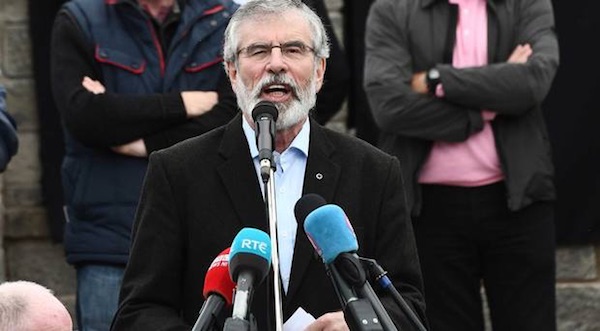
Speaking at Sinn Fein’s main commemoration for hunger striker Thomas Ashe, who died as a result of force-feeding five days into a hunger strike in Mountjoy Jail in September 1917, Gerry Adams has said said his party is still committed to making a deal with the DUP to return to powersharing.
The Sinn Fein president denied claims by unionists they have lost interest in current negotiations about restoring the Executive at Stormont.
Mr Adams said: “Sinn Fein is fully committed to the powersharing institutions and we are working to restore them. However, the lesson of recent years is clear. As Martin McGuinness reminded us the political institutions can only work if they are based on equality, respect and integrity.
“Our opponents, including elements in the DUP, the Fianna Fail leadership and others claim Sinn Fein is no longer interested in the Assembly. They know this is a lie.”
Mr Adams made the comments at a Ballymurphy event to commemorate hunger strikers and the centenary of the death of Thomas Ashe, the first Irish hunger striker of the 20th century.
Events were held across Ireland to mark the centenary of the death of Thomas Ashe, who is honoured as a leading figure in the 1916 Rising, having led the Fifth Battalion of the Irish Volunteers, the Fingal Brigade, at the Battle of Ashbourne during Easter Week 1916.
Hiis death as a result of hunger strike and his subsequent funeral became an occasion for the Volunteers to regroup and show their strength. Tens of thousands attended the funeral, reinforced by the grief and anger felt throughout Ireland at the cruel manner of Ashe’s death, and became a historic show of republican strength.
The main Sinn Fein commemoration march, organised by the Ballymurphy ex-PoWs, assembled at the junction of Ballymurphy Road and Whiterock Road and proceeded to the Ballymurphy Memorial Garden on Sunday. Mr Adams unveiled a new monument to all of Ireland’s hunger strike martyrs during the event and surprised those attending by recommitting his party to restoring a Six County administration.
“In order that there is no doubt - let me make it clear to everyone, including republican grassroots; our leadership is up for doing a deal with the DUP and the other parties, and of moving back into the Executive on that basis,” he said.
“Let the DUP and the two governments also be in no doubt. No policy can be sustained without the informed consent of citizens.”
A series of talks between the main parties aimed at restoring the devolved institutions at Stormont have so far been unsuccessful. Sinn Fein has said there can be no return to government without a stand-alone Irish Language Act and a commitment from the DUP to allow the introduction of same-sex marriage. British Direct Ruler James Brokenshire has previously indicated that if a resolution is not reached by mid-October, direct rule may be introduced.
Mr Adams’s comments were welcomed by DUP negotiator Simon Hamilton. “Gerry Adams’ change of tone is a step forward,” he said. “The DUP has had no preconditions and stands ready to reestablish an Executive immediately.”
COMMEMORATIONS
Many commemorations were held across Ireland to mark the centenary of the death of Thomas Ashe, including a march last Saturday from the GPO in O’Connell Street, Dublin, to Ashe’s grave in Glasnevin Cemetery, at which Sinn Fein’s Mary Lou McDonald TD spoke.
A Sinn Fein commemoration was also held in Clonakilty, County Cork, last Monday evening. Cionnaith O Suilleabhain recalled the life of Thomas Ashe from his native Kerry to school principal in County Dublin, to Irish Volunteer and leader during the 1916 Rising, and to his imprisonment in the summer of 1917 which led him to go on hunger strike. The names, dates of death and number of days on hunger strike of the other 21 Irish republicans who have died while on hunger strike up to 1981 were read out.
The 1916 Societies also neld a National Hunger Strike march on the 24th September to commemorate the Ashe centenary as well as in memory of Ireland’s other 21 political prisoners who died as a result of hunger strike. The march, organised by the Sean Heuston Society, made its way to Glasnevin Cemetery.
At the state event last weekend, Glasnevin Trust chairman John Green said Ashe’s funeral matched O’Donovan Rossa’s in size and impact, but he suggested it would be a “travesty” if the only thing to be remembered about Ashe was the circumstances of his death.
During the Easter Rising, Ashe had been “spectacularly successful” during the Battle of Ashbourne, Mr Green said, which would provide the template for the IRA’s activities during the War of Independence.
Mr Green added: “We often ask the question: ‘What if Michael Collins had lived?’ Today we ask the same question: ‘What if Thomas Ashe had lived?’”
![[Irish Republican News]](https://republican-news.org/graphics/title_gifs/rn.gif)
![[Irish Republican News]](https://republican-news.org/graphics/title_gifs/harp.gif)

